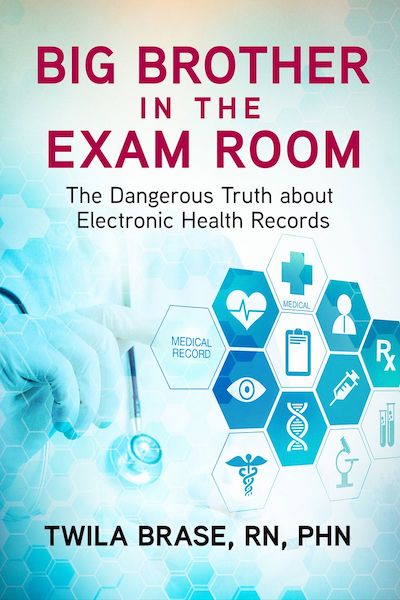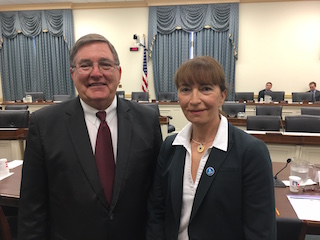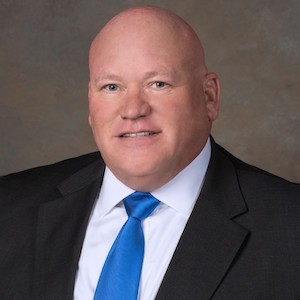health care system
See the following -
CCHF Unveils Book Warning of "the Dangers of Electronic Health Records" at the FreedomFest 2018 Conference
 A new, groundbreaking book from Citizens’ Council for Health Freedom (CCHF) will expose how the mandated, government-certified EHR technology (CEHRT) has negatively affected both doctors and patients. Written by CCHF president and co-founder Twila Brase, RN, PHN, and published by Beaver’s Pond Press...Brase’s extensively researched work shows how and why Congress forced doctors and hospitals to install a data-collecting, command and control surveillance system in the exam room. It also includes the impact of EHRs on privacy, patient care, costs, patient safety and more, according to doctors and more than 125 studies....This week, Brase is unveiling “Big Brother in the Exam Room” at FreedomFest 2018 at the Paris Resort Las Vegas. Brase will be a part of several panels and will introduce the book to fellow freedom-loving patriots who recognize that rights also extend to health care...
A new, groundbreaking book from Citizens’ Council for Health Freedom (CCHF) will expose how the mandated, government-certified EHR technology (CEHRT) has negatively affected both doctors and patients. Written by CCHF president and co-founder Twila Brase, RN, PHN, and published by Beaver’s Pond Press...Brase’s extensively researched work shows how and why Congress forced doctors and hospitals to install a data-collecting, command and control surveillance system in the exam room. It also includes the impact of EHRs on privacy, patient care, costs, patient safety and more, according to doctors and more than 125 studies....This week, Brase is unveiling “Big Brother in the Exam Room” at FreedomFest 2018 at the Paris Resort Las Vegas. Brase will be a part of several panels and will introduce the book to fellow freedom-loving patriots who recognize that rights also extend to health care...
- Login to post comments
CHIME Asks ONC to Rethink NwHIN
CHIME submitted comments this week to the Office of the National Coordinator for Health IT, responding to the agency’s vision for nationwide health information exchange. ONC officials in May released a Request for Information (RFI) that sought feedback on how to establish a governance mechanism for the nationwide health information network (NwHIN). Read More »
- Login to post comments
Coronavirus Adds New Stress To Antiquated Health Record-Keeping
 The U.S. health care system is on the leading edge of many technologies - except when it comes to passing information between doctors, laboratories, and public health officials. And that could add another snarl to the already troubled effort to test for coronavirus. Overreliance on faxing, phones and paper records is problem enough in ordinary times. Adding thousands of coronavirus tests a day will test the ability of providers, labs, and public health officials to keep track of all the results. Because not all results are automatically downloaded into physicians' records, the doctors may need to log into laboratory web portals or, if all else fails, turn to faxes and phones to learn test results.
The U.S. health care system is on the leading edge of many technologies - except when it comes to passing information between doctors, laboratories, and public health officials. And that could add another snarl to the already troubled effort to test for coronavirus. Overreliance on faxing, phones and paper records is problem enough in ordinary times. Adding thousands of coronavirus tests a day will test the ability of providers, labs, and public health officials to keep track of all the results. Because not all results are automatically downloaded into physicians' records, the doctors may need to log into laboratory web portals or, if all else fails, turn to faxes and phones to learn test results.
- Login to post comments
Doctors And Patients Are Both Losing in Our Health System
As I advanced through medical school and into my family medicine residency, I was increasingly exposed to the “inner workings” of health care. Behind the scenes I saw much of the doctors’ time spent on issues other than patients’ health. Seemingly, the documentation about what they did took more time that what they actually did.
- Login to post comments
GWU Milken Institute School of Public Health releases report on deaths due to Hurricane Maria in Puerto Rico and outlines steps to protect the most vulnerable communities from disasters
 In an independent report published today, researchers at the George Washington University Milken Institute School of Public Health (GW Milken Institute SPH) estimated there were 2,975 excess deaths in Puerto Rico due to Hurricane Maria from September 2017 through the end of February 2018. The researchers also identified gaps in the death certification and public communication processes and went on to make recommendations that will help prepare Puerto Rico for future hurricanes and other natural disasters.
In an independent report published today, researchers at the George Washington University Milken Institute School of Public Health (GW Milken Institute SPH) estimated there were 2,975 excess deaths in Puerto Rico due to Hurricane Maria from September 2017 through the end of February 2018. The researchers also identified gaps in the death certification and public communication processes and went on to make recommendations that will help prepare Puerto Rico for future hurricanes and other natural disasters.
- Login to post comments
Health Datapalooza 2017 – The Data Revolution Rolls On
 The 8th annual Health Datapalooza returns on April 26 – 28 and offers a re-imagined vision of health and health care through the lens of data. In years past, Health Datapalooza has set its sights on health-care startups, apps, big data, electronic health records – you name it – but the main thrust was always more about the business of health care and how tech and data are used to innovate. The annual conference for data geeks, developers, health tech venture capitalists, and start-up wannabes, among others, will this year triangulate around the idea that the patient should be at the center of health care.
The 8th annual Health Datapalooza returns on April 26 – 28 and offers a re-imagined vision of health and health care through the lens of data. In years past, Health Datapalooza has set its sights on health-care startups, apps, big data, electronic health records – you name it – but the main thrust was always more about the business of health care and how tech and data are used to innovate. The annual conference for data geeks, developers, health tech venture capitalists, and start-up wannabes, among others, will this year triangulate around the idea that the patient should be at the center of health care.
- Login to post comments
Health IT Groups Criticize Information Exchange Regulation Plan
Organizations representing private-sector stakeholders have reacted negatively to the framework for governance and operations of the Nationwide Health Information Network (NwHIN) that the Office of the National Coordinator of Health IT (ONC) described in a recent request for information (RFI). Read More »
- Login to post comments
HIMSS18: Seema Verma - Making the patient the center of our health care system
 I’ve always been struck by how seldom the patient is mentioned in discussions around value-based care. Let me be clear, we will not achieve value-based care until we put the patient at the center of our healthcare system. Until patients can make their own decisions based on quality and value health care costs will continue to grow at an unsustainable rate. This administration is dedicated to putting patients first, to be empowered consumers of health care that have the information they need to be engaged and active decision-makers in their care. Through this empowerment, there will be a competitive advantage for providers that deliver coordinated, quality care, at the best value, to attract patients who are shopping for value.
I’ve always been struck by how seldom the patient is mentioned in discussions around value-based care. Let me be clear, we will not achieve value-based care until we put the patient at the center of our healthcare system. Until patients can make their own decisions based on quality and value health care costs will continue to grow at an unsustainable rate. This administration is dedicated to putting patients first, to be empowered consumers of health care that have the information they need to be engaged and active decision-makers in their care. Through this empowerment, there will be a competitive advantage for providers that deliver coordinated, quality care, at the best value, to attract patients who are shopping for value.
- Login to post comments
How the American Health Care Business Turned Patients into Consumers
 A clash of cultures is rapidly developing among those of us who see the mission of the health care system to be primarily the diagnosis and healing of illness and those who see it primarily as an opportunity to create personal wealth. The concept of health care primarily as a business is uniquely American, and it has gained ascendancy during the last few decades. While there have always been a few greedy doctors, businessmen-wealth-seekers — not doctors — now dominate the medical-industrial complex.
A clash of cultures is rapidly developing among those of us who see the mission of the health care system to be primarily the diagnosis and healing of illness and those who see it primarily as an opportunity to create personal wealth. The concept of health care primarily as a business is uniquely American, and it has gained ascendancy during the last few decades. While there have always been a few greedy doctors, businessmen-wealth-seekers — not doctors — now dominate the medical-industrial complex.
- Login to post comments
How to Make Doctors Irrelevant
After a simple, modified Paleo diet reversed her multiple sclerosis, one doctor is exposing health care and big pharma’s dirty secret: Prescriptions don’t make you well. Read More »
- Login to post comments
Humetrix Presents Disruptive Personal Health App Solutions Before US Congress
 As a former practicing physician, data scientist and public health officer, I became a healthcare IT entrepreneur focusing on mobile technology because I believed that the best way to treat patients, improve health outcomes, and reduce waste is to put patients’ critical health information into their own hands, so they can share that information with their physicians when needed. With 68 percent of Americans using a smart phone daily1, and new HIPAA rules giving each of us a legal right to electronically access our health records, consumer facing mobile health applications can be a cure to the information blocking which is still plaguing our health care system. In a healthcare environment in which one-third of expenditures are wasted3 on redundant care, and medical errors representing the third leading cause of death in the U.S. today4, having immediate access to a patient’s health history can literally save lives and also significantly reduce healthcare costs.
As a former practicing physician, data scientist and public health officer, I became a healthcare IT entrepreneur focusing on mobile technology because I believed that the best way to treat patients, improve health outcomes, and reduce waste is to put patients’ critical health information into their own hands, so they can share that information with their physicians when needed. With 68 percent of Americans using a smart phone daily1, and new HIPAA rules giving each of us a legal right to electronically access our health records, consumer facing mobile health applications can be a cure to the information blocking which is still plaguing our health care system. In a healthcare environment in which one-third of expenditures are wasted3 on redundant care, and medical errors representing the third leading cause of death in the U.S. today4, having immediate access to a patient’s health history can literally save lives and also significantly reduce healthcare costs.
- Login to post comments
Judgment Day: Dr. Margaret Flowers on What Follows the Supreme Court Ruling on Healthcare
Margaret Flowers, MD, is a pediatrician whose exasperation with the American healthcare system turned her into a single-payer activist. In 2009 she was arrested at the Senate Round Table on Health Insurance for attempting to speak on behalf of a single-payer plan when single-payer had been cut out of the conversation. Read More »
- Login to post comments
Let's Do Public Health Better
 Eric Reinhart, who describes himself as “a political anthropologist, psychoanalyst, and physician,” has had a busy month. He started with an essay in the New England Journal of Medicine (NEJM) about “reconstructive justice,” then an op-ed in The New York Times on how our health care system is demoralizing the physicians who work in it, and then the two that caught my attention: companion pieces in The Nation and Stat News about reforming our public health “system” from a physician-driven one to a true community health one. He's preaching to my choir. I wrote almost five years ago: “We need to stop viewing public health as a boring, not glamorous, small part of our healthcare system, but, rather, as the bedrock of it, and of our health.” Dr. Reinhart pulls no punches about our public health system(s), or the people who lead them...
Eric Reinhart, who describes himself as “a political anthropologist, psychoanalyst, and physician,” has had a busy month. He started with an essay in the New England Journal of Medicine (NEJM) about “reconstructive justice,” then an op-ed in The New York Times on how our health care system is demoralizing the physicians who work in it, and then the two that caught my attention: companion pieces in The Nation and Stat News about reforming our public health “system” from a physician-driven one to a true community health one. He's preaching to my choir. I wrote almost five years ago: “We need to stop viewing public health as a boring, not glamorous, small part of our healthcare system, but, rather, as the bedrock of it, and of our health.” Dr. Reinhart pulls no punches about our public health system(s), or the people who lead them...
- Login to post comments
ONC Timeline for TEFCA Going Live in 2022
 Today we are pleased to announce the timeline for the Trusted Exchange Framework and Common Agreement (TEFCA). The 21st Century Cures Act, signed by President Obama in 2016, calls on ONC to "develop or support a trusted exchange framework, including a common agreement among health information networks nationally."... The timeline released today-for completion of the Trusted Exchange Framework, the Common Agreement Version 1 and the Qualified Health Information Network (QHIN) Technical Framework (QTF) Version 1-establishes our goal to have this new network open for participation in the first quarter (Q1) of calendar year 2022.
Today we are pleased to announce the timeline for the Trusted Exchange Framework and Common Agreement (TEFCA). The 21st Century Cures Act, signed by President Obama in 2016, calls on ONC to "develop or support a trusted exchange framework, including a common agreement among health information networks nationally."... The timeline released today-for completion of the Trusted Exchange Framework, the Common Agreement Version 1 and the Qualified Health Information Network (QHIN) Technical Framework (QTF) Version 1-establishes our goal to have this new network open for participation in the first quarter (Q1) of calendar year 2022.
- Login to post comments
Pandemic Stresses National Need for Seamless Information Sharing Between Healthcare Providers, Black Book 2020 Interoperability Surveys
 Two of three consumers revealed they will consider changing their physician and hospital providers in the coming year after learning how their health record was not shareable or available or was blocked in the past year...Five hundred and nine managers of frontline providers confirm the lack of general interoperability across the entire U.S. health care system has detracted from COVID-19 patient care, led to poor health outcomes and higher expenditures, and left population health data muddy and deficient...."Portability of data in the middle of this pandemic is vital," said Doug Brown, President of the survey organization Black Book Research. "But resolving systemic data blocking and platforms interfering with the exchange of patient data are not on the industry's front burner."
Two of three consumers revealed they will consider changing their physician and hospital providers in the coming year after learning how their health record was not shareable or available or was blocked in the past year...Five hundred and nine managers of frontline providers confirm the lack of general interoperability across the entire U.S. health care system has detracted from COVID-19 patient care, led to poor health outcomes and higher expenditures, and left population health data muddy and deficient...."Portability of data in the middle of this pandemic is vital," said Doug Brown, President of the survey organization Black Book Research. "But resolving systemic data blocking and platforms interfering with the exchange of patient data are not on the industry's front burner."
- Login to post comments